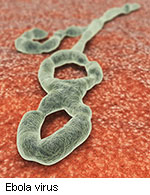October 1, 2014

 By Dennis ThompsonHealthDay Reporter
By Dennis ThompsonHealthDay Reporter
Latest Infectious Disease News
MONDAY, Sept. 29, 2014 (HealthDay News) — Another American doctor exposed to the Ebola virus while working in West Africa was admitted Sunday to a hospital at the National Institutes of Health in suburban Washington, D.C.
The unidentified patient was working at an Ebola treatment unit in Sierra Leone when exposed to the highly lethal virus that has been ravaging four West African nations for months.
The patient was admitted to the NIH Clinical Center’s special clinical studies unit “out of an abundance of caution,” the agency said in a news release. The unit’s staff is “trained in strict infection control practices optimized to prevent spread of potentially transmissible agents such as Ebola,” the release said.
Dr. Anthony Fauci, director of the NIH’s National Institute of Allergy and Infectious Diseases, wouldn’t discuss details about the patient. But he told the Associated Press that exposure to the Ebola virus doesn’t automatically mean someone will become sick.
“When someone is exposed, you want to put them into the best possible situation so if something happens you can take care of them,” Fauci said.
The patient poses minimal risk to the NIH staffers and the public, the news release said.
The patient is the fifth U.S. health care professional exposed to the Ebola virus while working in West Africa.
Three others who became infected with the virus have recovered, while a fourth continues to undergo treatment at Emory University Hospital in Atlanta.
The third American Ebola patient to become infected — a medical missionary — left a Nebraska hospital on Thursday, free of the virus.
Treatments given to Dr. Rick Sacra, 51, included doses of an experimental drug and blood transfusions from a fellow U.S. medical missionary who also survived infection with the virus.
“The CDC [U.S. Centers for Disease Control and Prevention] has declared me safe and free of virus,” Sacra said during a Thursday morning news conference at Nebraska Medical Center in Omaha. “Thank God. I love you all.”
Sacra said his friend and fellow medical missionary and Ebola survivor, Dr. Kent Brantly, “communicated with me about a week ago and let me know in no uncertain terms that this was not going to be a quick recovery. So I have to take things one day at a time.” Brantly gave blood to Sacra in the hope that antibodies to the Ebola virus would aid Sacra in his recovery.
Sacra received two transfusions of blood serum from Brantly, the first American to be infected with the virus during the West African outbreak. The men are good friends and both work for missionary groups active in the fight against Ebola in West Africa.
Nebraska hospital officials said Thursday that they don’t know what helped Sacra survive his ordeal — the experimental drug, the transfusions, the supportive care provided by doctors and nurses, or the combination of all three.
Both Brantly, 33, and another American aid worker, Nancy Writebol, 59, made a full recovery from Ebola following treatment with another experimental drug called ZMapp at Emory University Hospital in Atlanta.
The Ebola epidemic in West Africa is the worst outbreak ever of the disease. So far, an estimated 6,500 people have become infected and nearly 3,100 have died in the countries of Guinea, Liberia, Nigeria and Sierra Leone, according to the World Health Organization.
The epidemic could strike as many as 1.4 million people by mid-January unless the global community mounts a rapid response to the crisis, according to estimates by the CDC.
 Copyright © 2014 HealthDay. All rights reserved.
Copyright © 2014 HealthDay. All rights reserved.
SOURCES: Sept. 28, 2014, news release, U.S. National Institutes of Health; Sept. 25, 2014, news conference with Rick Sacra, M.D., at Nebraska Medical Center, Omaha; World Health Organization; Associated Press
![]()